Africa to host major sporting event
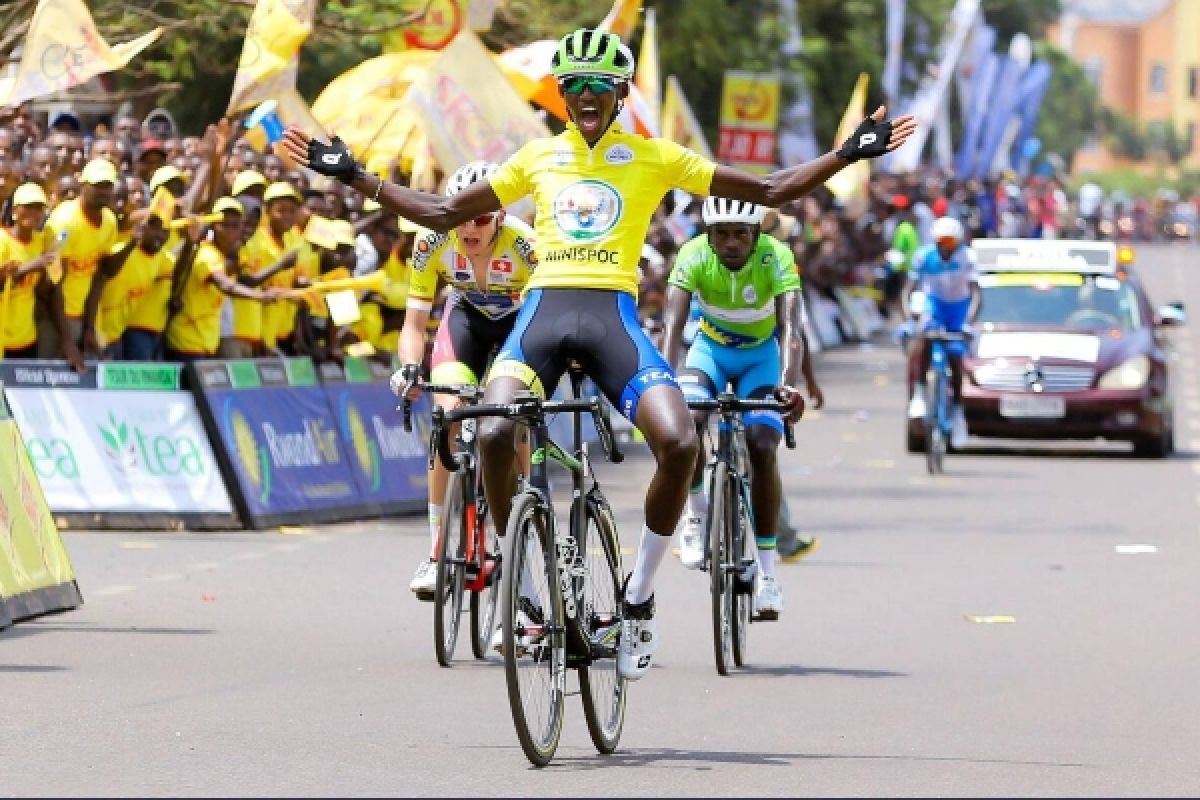
Following the recent announcement that the UCI Road World Championships will be held for the first time in Africa in 2025, Andrea Dijkstra speaks to African cyclists about what this will mean for professional cycling on the continent.
The final decision on who will host the World Championships for bicycle road racing in 2025 may not be announced until September, but it’s sure to be big news for African sport.
Speaking at the Tour du Rwanda race in May, the head of cycling’s governing body, UCI president David Lappartient, revealed that the showcase sporting event would either be held in the Rwandan capital, Kigali, or the Moroccan city of Tangier.
It will mark the first time the continent has hosted the World Championships, and only the 11th time a non-European nation has done so.
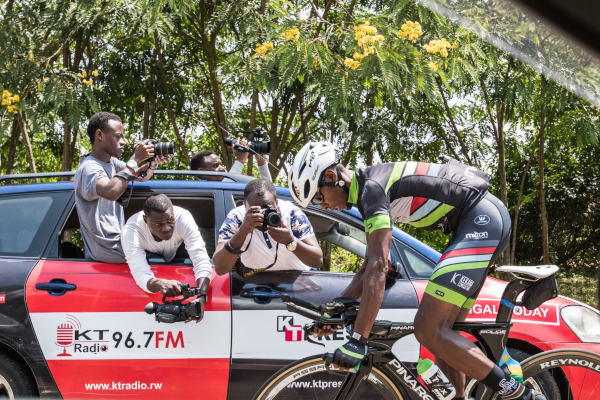
Above: Rwandan journalists reporting live from the 2018 African Continental Championships. Skyler Bishop Photography.
Rwanda seems to be a firm favourite, according to American cyclist Jonathan Boyer, who told NewsAfrica: ‘The nation has proven with the Tour du Rwanda that they are capable of organising a top-quality event.’
The Tour du Rwanda is an annual cycling event that began as a regional race in 1988 before it was elevated to the international UCI calendar in 2008.
Ethiopian pro-cyclist Tsgabu Grmay also thinks that Rwanda has the best chance of winning the bid.
He remembered the ‘amazing atmosphere’ in Kigali where thousands of people lined the streets in 2010 when he participated in the African Continental Cycling Championships there, as well as the Tour du Rwanda.

Above: Ethiopian legend Tsgabu Grmay during his racing heyday.
‘They have the fans, a professional federation and good roads,’ said Grmay, who was the first Ethiopian to participate in the Tour de France in 2016.
The punishing cobblestoned climb, known as the ‘Wall of Kigali’, could become a spectacular part of the World Championships, according to the rider of Team BikeExchange, ‘as there is always lots of drama going on’.
‘With all the media coverage, this wall could become world famous,’ the Ethiopian athlete predicted.
Despite the continent’s long-time domination of endurance running, few Africans have made it to the top in pro-cycling.
Eritrea has produced a handful of top cyclists, including Daniel Teklehaimanot, who became the first rider from an African team to wear the polka-dot jersey at the Tour de France in 2015, and Natnael Berhane, professional road-bicycle racer and two-time African cycling champion, who currently rides for UCI WorldTeam Cofidis. Also from the region is Rwandan Adrien Niyonshuti, who was the flagbearer for his country during the 2012 Olympic Games in London and four years later in Rio de Janeiro.
But the most famous is Kenya-born four-time Tour de France winner Chris Froome, who won a medal for Kenya in the All Africa Games in 2007, but in 2008 switched allegiance to Britain, after receiving little support from the Kenya Cycling Federation.
The grandson of British emigrants, he grew up with his single mother, Jane, in a one-bedroom apartment in Nairobi. She had no car and worked multiple jobs to survive. He started cycling on an old road bicycle he got from one of his primary school teachers.
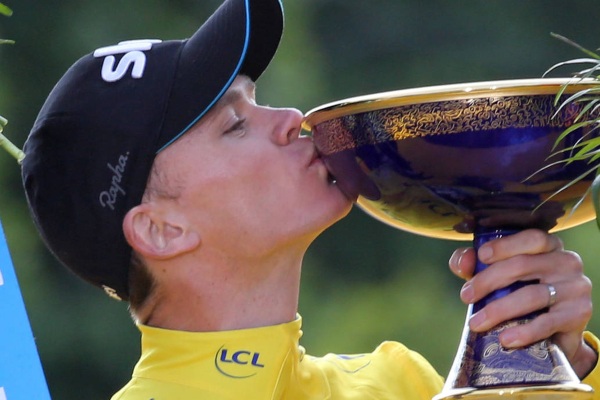
Above: Four-time Tour de France winner Chris Froome. Alamy.
‘Cycling is one of the most expensive sports,’ explained Grmay. ‘While you could start running even barefoot, you need a modern, technical bike, helmet, shoes and clothing for cycling. And as we don’t have many manufacturing companies in Africa, this costs a lot of money that most people in Africa don’t have.’
The lack of training facilities is another challenge in Africa, according to the Ethiopian, who was one of the lucky few to be selected to train at the continent’s only world-class cycling centre, the UCI World Cycling Centre (WCC) in South Africa.
Since the African cycling hub opened in 2005, hundreds of athletes from nearly 30 different national federations have trained at the centre, which was formerly located just outside Johannesburg but now sits 1,400m above sea level in the vine-studded hills of Paarl, near Cape Town.
‘These training centres were a turning point for my development and that of so many other cyclists,’ said Grmay. ‘I learned so much about mentality, discipline, nutrition, eating a small amount of calories, the system of training, how to be motivated every day, and also how to recover well.’
Despite all this training, the Ethiopian rider struggled to adapt to the European style of racing.
‘My first races in Switzerland were a nightmare,’ said Grmay. ‘It was extremely cold and windy. It didn’t feel like cycling but more like torture.
‘In Ethiopia, we were with a maximum of 30 riders in a peloton, while in Switzerland, there were easily 200 athletes. Other cyclists pushed me, which was new to me, and they were extremely fast, even when it started to rain. They were not scared at all. This was so different from cycling in Ethiopia, which is so slow.’
Notwithstanding the challenges, Grmay is optimistic about the future for African cyclists.
‘We have high altitudes to train and, thanks to the tough African life, we have the physical strength. Therefore, I’m 100 per cent sure that an African rider will win the Tour de France at some point. But this will take at least another 10 years.’

One of the main problems facing the sport, according to the Kenyan cyclist and coach David Kinjah, is the federations whose job it is to promote cycling.
‘The Kenya Cycling Federation has had the same chairman for over 30 years now and he is only interested in making money for himself,’ the flamboyant coach and one-time mentor of Chris Froome explained.
‘It’s extremely difficult to find sponsors for a race as the federation will demand 10 million Kenyan shilling ($93,000), of which they keep nine million ($83,500). This obviously scares off sponsors.’
He said he and his Safari Simbaz cycling team frequently didn’t receive their prize money after winning races in Kenya. ‘Some of my boys won a big race in 2019 and they still didn’t get their money.
‘Also the winners of the 2019 Tour de Machakos, which was organised by the County Government, still didn’t receive their prize money. These kind of practises are so demoralizing.’
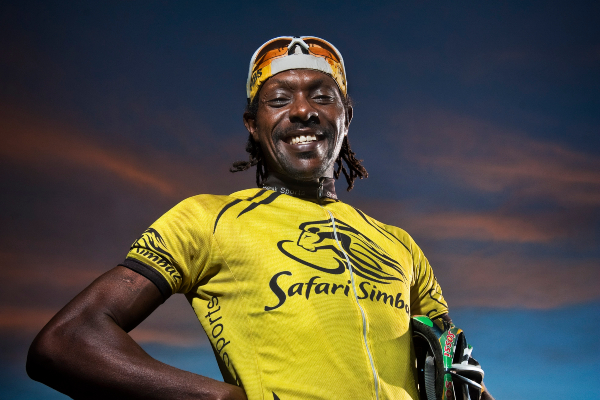
Above: Kenya's David Kinjah photographed by Jeroen van Loon.
He accused several cycling federations of corruption, but reserved his harshest criticism for the UCI, which he said ‘doesn’t have teeth to do anything’ about it.
‘The UCI constitution states that it will carry out its activities in compliance with the principles of non-interference in the internal affairs of affiliated federations.’
It’s a view echoed by Boyer, who believes corruption is a huge problem for African cycling.
‘Cycling is growing in Africa. There are more and more committed individuals, clubs and a few federations working to support cycling and help it grow,’ said the former coach for Rwanda's national cycling team.
‘But this is despite all of the corrupt federations that only have their self-interests at the heart of the organisation.
‘It is also tragic that the Confederation of African Cycling (CAC) does little to advance and support cycling in Africa, again the self-interests of those in charge are the reason.’
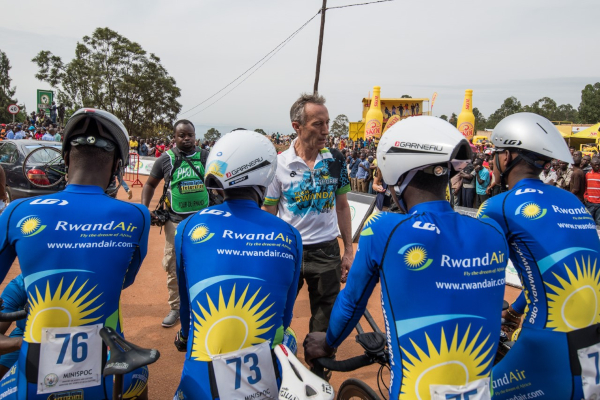
Above: Former Rwanda national coach Jonathan Boyer with his racers. Credit: Skyler Bishop Photography.
Jean-Pierre Van Zyl, Director of the UCI World Cycling Centre (WCC) Africa, said in a response to NewsAfrica Magazine that he ‘isn’t aware of any corruption’. However, he does acknowledge that a bigger project is necessary to grow pro-cycling in Africa alongside the World Championships.
‘We want to broaden our footprint whereby we plan to recognise bigger national federations,’ the WCC Africa Director said.
‘We also want to create regional satellite races and talent identification camps to select most talented athletes at a younger age.
‘If we would organise a big, satellite race in western Africa, for example, cyclists from 11 countries would be able to come,’ the former South African cyclist explained. ‘This could have a huge impact.’
Van Zyl believes more races would also bring more marketing opportunities, creating more funding for local cycling, as well as increased grassroots level awareness for the sport.
‘In Europe, many racers start cycling when they are four and have their first professional race when they are 11. In Africa people only start racing when they are around 19 years old, which is already late to still reach top level.’
However, Kinjah, who was the first black African rider to sign for a European professional team, is sceptical about the UCI’s plans. ‘We don’t need more races as sponsors will shy away due to corrupt federations demanding way too much money,’ said Kinjah.
He also believes its problematic that national federations decide which cyclists will go to the UCI World Cycling Centre in South Africa.
‘I tried to send a boy who won all races in Kenya. People from the UCI wanted him, but the Kenyan Cycling Federation didn’t like the boy, so he didn’t go eventually.’
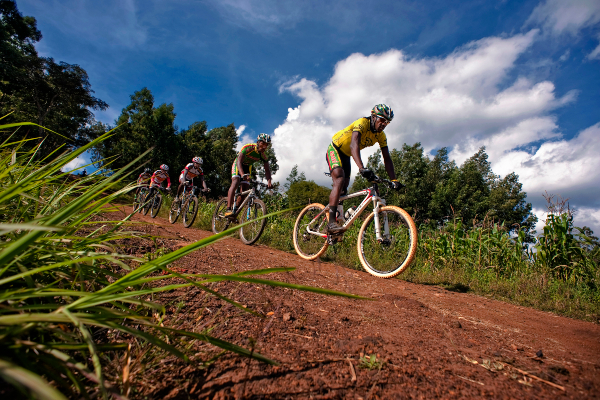
According to Kinjah, cyclists should start forming their own private teams and clubs, and the UCI should come up with a system to fund these genuine clubs directly.
‘It’s not a problem of equipment or bikes,’ Kinjah continued. ‘We can get money, but because of corruption, it becomes so difficult to develop these clubs and teams and to keep money in the pockets of these cyclists to keep them training hard.’
Despite his criticism, the Kenyan coach is happy that the UCI Road World Championships are finally going to be held on African soil. ‘If they are going to be hosted by Rwanda, this is going to be such a recognition for the hard work that Tom Ritchey and [Jonathan] Jock Boyer did with starting and growing Team Rwanda, as well as for the Rwandan cyclists, and also the Rwandan government that saw and supported this potential.’
But while he thinks the event will have a huge impact on the sport’s popularity in Rwanda or Morocco – assuming Tangier pips Kigali to the post – he questioned whether the same would be for the rest of the continent.
‘We would need other World Championships coming to Africa, like in another 10 years. One won’t be enough.’
Van Zyl, on the other hand, is optimistic that the 2025 World Championships will be the catalyst for the growth of cycling on the continent. ‘We need Europe to come to us because many cyclists cannot come to Europe, due to problems with visas,’ the UCI WCC Africa Director said. He added that he thinks cycling should be incorporated in the school system of African nations. ‘Unlike cycling, running is a school sport. We should get more kids on bikes, riding to school, and having small races. That’s how we will get there. But this will take time.’
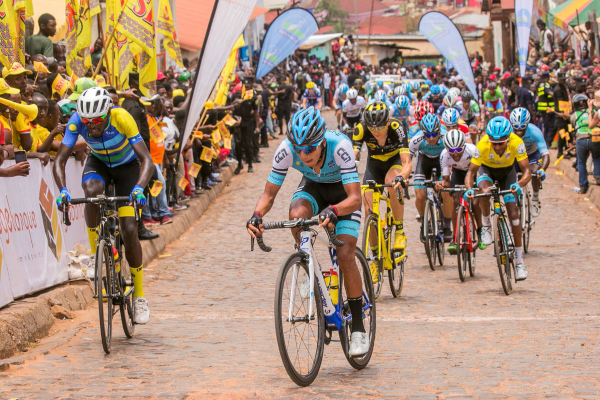
Above: Crowds at the 2018 Tour du Rwanda watching cyclists tackle the gruelling cobblestones of the 'Wall of Kigali'. Alamy.
Grmay said he was thrilled that the World Championships are finally coming to Africa.
‘This is really a big thing for African cycling. Cycling isn’t so big in most African countries, where football and running are far more popular. But these championships can really give a boost to the sport as they will inspire many boys and girls to start cycling as well.’
The Ethiopian said he has witnessed the impact of his three-times participation in the Tour de France in his homeland.
‘When I visit Ethiopia nowadays, young boys approach me and tell me that they also dream of participating in the Tour de France.
‘This is amazing if you realise that during my youth, nobody had ever heard of any grand tour in Europe yet. I’ve fulfilled my dream to participate in the Tour de France, and it’s an extra bonus that I now inspire other kids to start cycling.’
He added: ‘Hopefully these World Championships on African soil will have a similar impact.’



